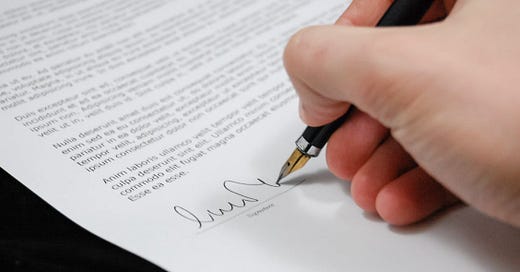A newsletter exploring businesses and strategies that use cutting edge language models to solve new problems and become more efficient.

Continuing in my quest to automate my entire life away, I’ve become increasingly interested in the legal tech industry. Specifically, Natural Language Processing (NLP) in the legal industry.
In 2016, a Deloitte Insights Report predicted that 39% of jobs in the legal sector stand to be automated in the next 10 years.
In addition, management consultancy group McKinsey estimates that 22 percent of a lawyer’s job and 35 percent of a law clerk’s job can be automated.
Being a text-focused industry, I think its inevitable that NLP will eventually become a fundamental tool in law. Even today, we have technology that is changing the way we interact with lawyers.
Having a personal lawyer is annoying and expensive. Most of the legal services needed by normal people involve routine documents and processes. It would be so much easier if we could just use a simple program to perform basic legal tasks for us instead of having to pay expensive legal bills.
As NLP gets more advanced, I think we are going to see more automation in the legal industry. There’s already several companies that are proving the feasibility of this idea that we’ll talk about.
I’ve been experimenting with twitter recently. So if you want to chat, “@” me on Twitter (@liamport9) or send me a DM. Many of my best ideas come from industry experience, so I’d love y’all’s input.
AXDraft
AXDraft is a contract management company that automates standard legal processes for large companies.
They work with each company individually to create templates for standard documents, and automate the process of creating and sending them out. For large companies that send out these documents often, it’s a huge efficiency boost.
AXDraft reports up to 100% speedup in creating and sending legal documents, which can save these companies a fortune. The best services are the ones that pay for themselves, and this one has certainly met that criteria.
Recently, AXDraft had a GPT-3 hackathon to help explore ways to integrate the cutting edge NLP model.
The hackathon lasted 9 hours, and they ended up with three products functional enough to be used straight away. Those products are:
1. Translating legal text into plain English (which I discussed in last week’s post)
2. Extracting/classifying data from legal documents.
3. Using GPT-3 to populate AXDraft templates (so they don’t need to be done manually)
If this company could come out of a hackathon in 9 hours with three different features using GPT-3, I’m interested to see what people come up with once this product is released to the public.
Donotpay
Donotpay is one of the more well known companies in this space. Their founder is a Stanford alum who originally got attention for creating donotpay as a service to automatically overturn parking tickets (because he kept getting them).
Donotpay’s main interface is through a chatbot. You select which category of issue you have (e.g. Traffic Dispute) and the bot asks you questions about your dispute, like what kind of ticket you are disputing, your location, a picture of the ticket, etc.
As the name suggests, this platform is geared towards getting you more money by disputing fines and challenging corporations. While I’m a bit unsure about “[Suing] anyone at the press of a button”, I think there’s a lot of convenience in an app like this.
Specifically, it gives ordinary people more legal firepower. The headache and high price of legal fees is often a barrier for normal people, and prevents them from taking action in response to unfair tickets or disputes.
Augrented
Augrented is the CARFAX of the apartment industry. They use publicly available information to rate the quality of different Apartments in NYC and San Francisco. It accelerates the apartment hunting process and protects tenants from being swindled into unfair (or even unsafe) housing situations.
Augrented is integrating GPT-3 to better explain legal notices to tenants and help tenant’s rights attorneys draft legal filings. This would ease the process of explaining and disputing eviction notices, for instance.

This is another great example of how legal tech can be used to empower ordinary people. In the wake of Covid-19, there will be an eviction crisis (cite), and many people do not have the means or knowledge to dispute unfair evictions. Products like Augrented can help people defend their rights.
Things are going to change
I think that the potential of legal tech is huge, especially given how fast language models have been improving. It removes a lot of hassle from a notoriously annoying industry. It saves people time, money, and headache. You get to have your cake and eat it too.
Augrented’s legal advisor bot is a great example of how GPT-3 could be used as a stand-in for a normal lawyer. One of the most comforting parts about having a personal lawyer is that they can answer any questions you may have. Now we’re reaching the point where language models can provide the same benefits.
If we were to combine a platform like donotpay with a legal advisor such as the one above, I think that would cover most people’s needs.
However, there’s one big issue.
Old industries tend to fight disruption, and who would be better equipped to fight such change as the legal industry itself?
I have a feeling lawyers know exactly how much risk they’re in. I’m no expert, but I’d expect a big fuss anytime someone tries to set up one of these companies.
However, as we begin to establish a beachhead with companies like donotpay and AXDrafts, I believe people will quickly see how much we need this change.


